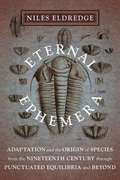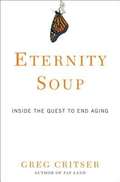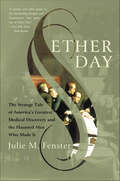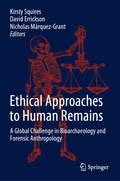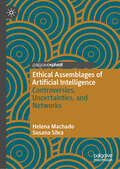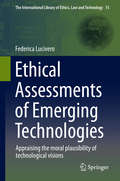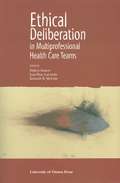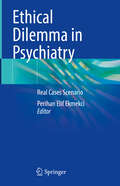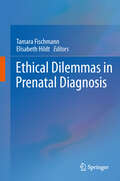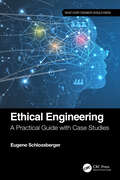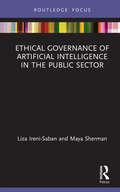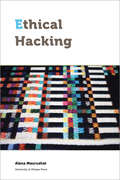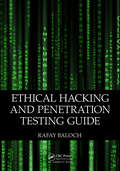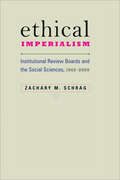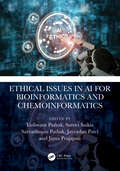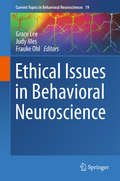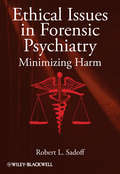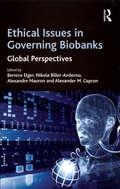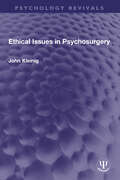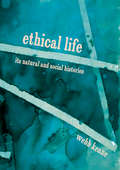- Table View
- List View
Eternal Ephemera
by Niles EldredgeFrom one of evolutionary biology's major contributors, a compelling work that unravels science's great "Mystery of Mysteries": how new species arise.
Eternal Ephemera: Adaptation and the Origin of Species from the Nineteenth Century Through Punctuated Equilibria and Beyond
by Niles EldredgeAll organisms and species are transitory, yet life endures. The origin, extinction, and evolution of species—interconnected in the web of life as "eternal ephemera"—are the concern of evolutionary biology. In this riveting work, renowned paleontologist Niles Eldredge follows leading thinkers as they have wrestled for more than two hundred years with the eternal skein of life composed of ephemeral beings, revitalizing evolutionary science with their own, more resilient findings.Eldredge begins in France with the naturalist Jean-Baptiste Lamarck, who in 1801 first framed the overarching question about the emergence of new species. The Italian geologist Giambattista Brocchi followed, bringing in geology and paleontology to expand the question. In 1825, at the University of Edinburgh, Robert Grant and Robert Jameson introduced the astounding ideas formulated by Lamarck and Brocchi to a young medical student named Charles Darwin. Who can doubt that Darwin left for his voyage on the Beagle in 1831 filled with thoughts about these daring new explanations for the "transmutation" of species.Eldredge revisits Darwin's early insights into evolution in South America and his later synthesis of knowledge into a theory of the origin of species. He then considers the ideas of more recent evolutionary thinkers, such as George Gaylord Simpson, Ernst Mayr, and Theodosius Dobzhansky, as well as the young and brash Niles Eldredge and Steven Jay Gould, who set science afire with their concept of punctuated equilibria. Filled with insights into evolutionary biology and told with a rich affection for the scientific arena, this book celebrates the organic, vital relationship between scientific thinking and its subjects.
Eternal Ephemera: Adaptation and the Origin of Species from the Nineteenth Century through Punctuated Equilibria and Beyond
by Niles EldredgeFrom one of evolutionary biology's major contributors, a compelling work that unravels science's great "Mystery of Mysteries": how new species arise.
Eternity Soup: Inside the Quest to End Aging
by Greg CritserMix the latest and most rigorous scientific research, irrepressible old-fashioned entrepreneurship, and the ancient human desire to live forever (or at least a lot longer) and the result is today's exploding multibillion-dollar antiaging industry. Its achievements are so far mostly marginal, but its promises flow with all the allure of a twenty-first-century fountain of youth. In Eternity Soup, acclaimed science writer Greg Critser takes us to every outpost of the antiaging landscape, home to zealots and skeptics, charlatans, and ingenious clinicians and academics. We visit a conference of the Caloric Restriction Society, whose members-inspired by certain laboratory findings involving mice-live their lives in a state just above starvation. ("It's only the first five years that are uncomfortable," says one. ) We meet the new wave of pharmacists who are reviving the erstwhile art of "compoundingr"using mortar and pestle to mix extravagantly profitable potions for aging boomers seeking to recapture flagging sexual vitality. Here, too, are the theorists and researchers who are seeking to understand the cellular-level causes of senescence and aging and others who say, Why bother with that? Instead, we should just learn how to repair and replace organs and tissue that break down, like a vintage automobile collector who keeps a century-old Model T shining and running like new. Eternity Soupis a simmering brew of testosterone patches, human growth hormone (so promising and so potentially dangerous), theories that view aging as a curable disease, laboratory-grown replacement organs ("I want to build a kidney," says one proponent. "It is such a stup-eed organ!"), and bountiful other troubling, hilarious, and invigorating ingredients. Critser finds plenty of chicanery and credulousness in the antiaging realm but also a surprising degree of optimism, even among some formerly sober skeptics, that we may indeed be on the cusp of something big. And that elicits its own new set of concerns: How will our society cope with a projected new cohort of a million healthy centenarian Americans? How will they liberate themselves from the age segregation that shunts them off to "Godr"s Waiting Rooms"in the sunbelt? Where will they find joy and meaning to match the inevitable loss that comes with longevity? Eternity Soup is an illuminating, wry, and provocative consideration of a long-dreamed-about world that may now be becoming a reality.
Ethanoleinspritzung mit Selbstzündung im Dieselverfahren: Methode zur Senkung der NOx-Emission (essentials)
by Nicolae Vlad BurneteNicolae Vlad Burnete beschreibt ein neues Verbrennungsverfahren im Dieselmotor, wobei eine Diesel-Voreinspritzung zu den erforderlichen Selbstzündungsbedingungen einer Ethanol-Haupteinspritzung führt. Seine Ergebnisse zeigen, dass die Schadstoffemissionen aufgrund einer geringeren Maximaltemperatur erheblich verringert werden können, während der Motorwirkungsgrad aufgrund einer erhöhten Effizienz der Verbrennung gleichzeitig erhöht wird. Dieses essential ist ein geeigneter Beitrag für eine grundsätzliche Umstrukturierung der Fahrzeugantriebe, weil nicht hauptsächlich die katalytische Nachbehandlung, sondern grundsätzlich die Prozesse im Brennraum das höchste Potenzial dafür bieten.
Ether Day: The Strange Tale of America's Greatest Medical Discovery and the Haunted Men Who Made It
by Julie M. FensterA fascinating and entertaining look at the men behind the first surgical use of anesthesia—and the price they paid for their breakthrough.On Friday, October 16, 1846, only one operation was scheduled at Massachusetts General Hospital....That day in Boston, the operation was the routine removal of a growth from a man's neck. But one thing would not be routine: instead of using pulleys, hooks, and belts to subdue a patient writhing in pain, this crucial operation would be the first performed under a general anesthetic. No one knew whether the secret concoction would work. Some even feared it might kill the patient.This engrossing book chronicles what happened that day and during its dramatic aftermath. In a vivid history that is stranger than fiction, Ether Day tells the story of the three men who converged to invent the first anesthesia—and the war of ego and greed that soon sent all three men spiraling wildly out of control.
Ethical Adaptation to Climate Change
by Allen Thompson Jeremy Bendik-KeymerPredictions about global climate change have produced both stark scenarios of environmental catastrophe and purportedly pragmatic ideas about adaptation. This book takes a different perspective, exploring the idea that the challenge of adapting to global climate change is fundamentally an ethical one, that it is not simply a matter of adapting our infrastructures and economies to mitigate damage but rather of adapting ourselves to realities of a new global climate. The challenge is to restore our conception of humanity--to understand human flourishing in new ways--in an age in which humanity shapes the basic conditions of the global environment. In the face of what we have unintentionally done to Earth's ecology, who shall we become? The contributors examine ways that new realities will require us to revisit and adjust the practice of ecological restoration; the place of ecology in our conception of justice; the form and substance of traditional virtues and vices; and the organizations, scale, and underlying metaphors of important institutions. Topics discussed include historical fidelity in ecological restoration; the application of capability theory to ecology; the questionable ethics of geoengineering; and the cognitive transformation required if we are to "think like a planet. "
Ethical Adaptation to Climate Change: Human Virtues of the Future
by Allen Thompson Jeremy Bendik-KeymerAn analytically precise and theoretically probing exploration of the challenge to our values and virtues posed by climate change.Predictions about global climate change have produced both stark scenarios of environmental catastrophe and purportedly pragmatic ideas about adaptation. This book takes a different perspective, exploring the idea that the challenge of adapting to global climate change is fundamentally an ethical one, that it is not simply a matter of adapting our infrastructures and economies to mitigate damage but rather of adapting ourselves to realities of a new global climate. The challenge is to restore our conception of humanity—to understand human flourishing in new ways—in an age in which humanity shapes the basic conditions of the global environment. In the face of what we have unintentionally done to Earth's ecology, who shall we become?The contributors examine ways that new realities will require us to revisit and adjust the practice of ecological restoration; the place of ecology in our conception of justice; the form and substance of traditional virtues and vices; and the organizations, scale, and underlying metaphors of important institutions. Topics discussed include historical fidelity in ecological restoration; the application of capability theory to ecology; the questionable ethics of geoengineering; and the cognitive transformation required if we are to “think like a planet.”
Ethical Approaches to Human Remains: A Global Challenge in Bioarchaeology and Forensic Anthropology
by Nicholas Márquez-Grant Kirsty Squires David ErricksonThis book is the first of its kind, combining international perspectives on the current ethical considerations and challenges facing bioarchaeologists in the recovery, analysis, curation, and display of human remains. It explores how museum curators, commercial practitioners, forensic anthropologists, and bioarchaeologists deal with ethical issues pertaining to human remains in traditional and digital settings around the world. The book not only raises key ethical questions concerning the study, display, and curation of skeletal remains that bioarchaeologists must face and overcome in different countries, but also explores how this global community can work together to increase awareness of similar and, indeed, disparate ethical considerations around the world and how they can be addressed in working practices. The key aspects addressed include ethics in bioarchaeology and forensic anthropology, the excavation, curation, and display of human remains, repatriation, and new imaging techniques. As such, the book offers an ideal guide for students and practitioners in the fields of bioarchaeology, osteoarchaeology, forensic anthropology, medical anthropology, archaeology, anatomy, museum and archive studies, and philosophy, detailing how some ethical dilemmas have been addressed and which future dilemmas need to be considered.
Ethical Assemblages of Artificial Intelligence: Controversies, Uncertainties, and Networks
by Helena Machado Susana SilvaThis book critically examines the ethical challenges of Artificial Intelligence (AI), focusing on facial recognition and AI-assisted reproductive technologies. It explores how these issues intertwine with social and political processes and power dynamics in digital societies. What defines ethical versus unethical in the realm of AI? Why do some ethical debates dominate, while others are overlooked? Which actors and institutions align or diverge in these discussions? To address these questions, the authors introduce the concept of "ethical assemblages," offering fresh perspectives on the complexities of AI ethics and their impact on socio-technoscientific structures.
Ethical Assessments of Emerging Technologies
by Federica LuciveroThis book systematically addresses the issue of assessing the normative nature of visions of emerging technologies in an epistemologically robust way. In the context of democratic governance of emerging technologies, not only it is important to reflect on technologies' moral significance, but also to address their emerging and future oriented character. The book proposes an original approach to deal with the issue of "plausible" ethical evaluation of new technologies. Taking its start from current debates about Technology Assessment, the proposed solution emerges as a combination of theoretical and methodological insights from the fields of Philosophy of Technology, Science and Technology Studies and a normative justification based on pragmatist ethics. The book's main contribution is to engage a diverse and interdisciplinary audience (ethicists, philosophers, social scientists, technology assessment researchers and practitioners) in a reflection concerning the epistemological challenges that are associated to the endeavour of appraising the moral significance of emerging technologies in the attempt of democratically governing them. It brings together concepts and methodologies from different disciplines and shows their synergy in applying them to two specific case studies of emerging biomedical technologies.
Ethical Deliberation in Multiprofessional Health Care Teams
by Hubert Doucet Jean-Marc Larouche Kenneth R. MelchinThis study analyzes both pragmatic and theoretical perspectives of ethical deliberation, as well as the professional and philosophical backgrounds for the ethical deliberation of social workers, nurses and doctors working in the field of chronic illness. In doing so, this volume expands the scope of current research through an analysis of the process and its dynamics.
Ethical Dilemma in Psychiatry: Real Cases Scenario
by Perihan Elif EkmekciPsychiatry is a field that differs from other fields of medical practice in terms of its ethical problems and ethical dilemmas it encounters. The physicians who specialize in the field of psychiatry or health professionals who work in mental health services should be equipped to recognize these ethical problems, to deal with them in the right ethical frameworks and to offer practical and appropriate solutions in their clinical practice. The work compiles extensive experiences from Medical Faculty of Ankara University, Turkey. The book aims to give a comprehensive understanding about the particular ethical problems and dilemmas in psychiatry and provide tools and methods to approach them in an ethically appropriate way.
Ethical Dilemmas in Prenatal Diagnosis
by Elisabeth Hildt Tamara FischmannTechnological developments in the life sciences confront us with new facets of a Faustian seduction. Are we "playing God" more and more, as claimed by critical authors of modernity? Achievements in genetic research produce ethical dilemmas which need to be the subject of reflection and debate in modern societies. Denial of ambivalences that ethical dilemmas arouse constitutes a threat to societies as well as to individuals. The book presents a compilation of some of the results of the interdisciplinary European study "Ethical Dilemmas Due to Prenatal and Genetic Diagnostics" (EDIG), which investigated some of these dilemmas in detail in a field which is particularly challenging: prenatal diagnosis. When results from prenatal diagnosis show fetal abnormalities, women and their partners are confronted with ethical dilemmas regarding: the right to know and the right not to know; decision-making about the remainder of the pregnancy and the desire for a healthy child; responsibility for the unborn child, for its well-being and possible suffering; life and death. This book provides answers from an ethical, psychoanalytical and medical viewpoint.
Ethical Engineering: A Practical Guide with Case Studies (What Every Engineer Should Know)
by Eugene SchlossbergerEthical Engineering: A Practical Guide with Case Studies provides detailed and practical guidance in making decisions about the many ethical issues practicing engineers may face in their professional lives. It outlines a decision-making procedure and helps engineers construct an ethics toolkit consisting of professional models, a comprehensive set of ethical considerations and factors that help in weighing those considerations, and analyses of particular issues, such as reverse engineering a patented process. Illustrating case studies, both brief and detailed, are provided. Features: • Introduces the nature of ethical decision-making as applied to engineering values and issues. • Helps readers develop a detailed ethics toolkit that identifies options and solutions and allows them to monitor and adjust as necessary. • Features topics such as safety, sustainability, bioethics, diversity and equality, information technology and AI, as well as critical areas often overlooked in engineering texts, such as mentoring, advertising (for consulting firms), engineering sales, and much more. • Includes 85 case studies to illustrate a variety of scenarios. • Offers an international perspective with codes of ethics from around the world, including Saudi Arabia, India, New Zealand, Chile, and Japan. Emphasizing the importance of the moral life and of engineering as an occupation with high ideals, this book helps readers navigate a variety of real-world ethical issues they are likely to face in this increasingly interdisciplinary, global, and diverse profession.
Ethical Governance of Artificial Intelligence in the Public Sector
by Liza Ireni-Saban Maya ShermanThis book argues that ethical evaluation of AI should be an integral part of public service ethics and that an effective normative framework is needed to provide ethical principles and evaluation for decision-making in the public sphere, at both local and international levels. It introduces how the tenets of prudential rationality ethics, through critical engagement with intersectionality, can contribute to a more successful negotiation of the challenges created by AI technological innovations in AI and afford a relational, interactive, flexible, and fluid framework that meets the features of AI research projects, so that core public and individual values are still honoured in the face of technological development. This book will be of key interest to scholars, students, and professionals engaged in public management and ethics management, AI ethics, public organizations, public service leadership, and more broadly to public administration and policy, as well as applied ethics and philosophy.
Ethical Hacking (Law, Technology and Media)
by Alana MaurushatHow will governments and courts protect civil liberties in this new era of hacktivism? Ethical Hacking discusses the attendant moral and legal issues. The first part of the 21st century will likely go down in history as the era when ethical hackers opened governments and the line of transparency moved by force. One need only read the motto “we open governments” on the Twitter page for Wikileaks to gain a sense of the sea change that has occurred. Ethical hacking is the non-violent use of a technology in pursuit of a cause—political or otherwise—which is often legally and morally ambiguous. Hacktivists believe in two general but spirited principles: respect for human rights and fundamental freedoms, including freedom of expression and personal privacy; and the responsibility of government to be open, transparent and fully accountable to the public. How courts and governments will deal with hacking attempts which operate in a grey zone of the law and where different ethical views collide remains to be seen. What is undisputed is that Ethical Hacking presents a fundamental discussion of key societal questions. A fundamental discussion of key societal questions. This book is published in English. - La première moitié du XXIe siècle sera sans doute reconnue comme l’époque où le piratage éthique a ouvert de force les gouvernements, déplaçant les limites de la transparence. La page twitter de Wikileaks enchâsse cet ethos à même sa devise, « we open governments », et sa volonté d’être omniprésent. En parallèle, les grandes sociétés de technologie comme Apple se font compétition pour produire des produits de plus en plus sécuritaires et à protéger les données de leurs clients, alors même que les gouvernements tentent de limiter et de décrypter ces nouvelles technologies d’encryption. Entre-temps, le marché des vulnérabilités en matière de sécurité augmente à mesure que les experts en sécurité informatique vendent des vulnérabilités de logiciels des grandes technologies, dont Apple et Google, contre des sommes allant de 10 000 à 1,5 million de dollars. L’activisme en sécurité est à la hausse. Le piratage éthique est l’utilisation non-violence d’une technologie quelconque en soutien d’une cause politique ou autre qui est souvent ambigue d’un point de vue juridique et moral. Le hacking éthique peut désigner les actes de vérification de pénétration professionnelle ou d’experts en sécurité informatique, de même que d’autres formes d’actions émergentes, comme l’hacktivisme et la désobéissance civile en ligne. L’hacktivisme est une forme de piratage éthique, mais également une forme de militantisme des droits civils à l’ère numérique. En principe, les adeptes du hacktivisme croient en deux grands principes : le respect des droits de la personne et les libertés fondamentales, y compris la liberté d’expression et à la vie privée, et la responsabilité des gouvernements d’être ouverts, transparents et pleinement redevables au public. En pratique, toutefois, les antécédents comme les agendas des hacktivistes sont fort diversifiés. Il n’est pas clair de quelle façon les tribunaux et les gouvernements traiteront des tentatives de piratage eu égard aux zones grises juridiques, aux approches éthiques conflictuelles, et compte tenu du fait qu’il n’existe actuellement, dans le monde, presque aucune exception aux provisions, en matière de cybercrime et de crime informatique, liées à la recherche sur la sécurité ou l’intérêt public. Il sera également difficile de déterminer le lien entre hacktivisme et droits civils. Ce livre est publié en anglais.
Ethical Hacking and Penetration Testing Guide
by Rafay BalochRequiring no prior hacking experience, Ethical Hacking and Penetration Testing Guide supplies a complete introduction to the steps required to complete a penetration test, or ethical hack, from beginning to end. You will learn how to properly utilize and interpret the results of modern-day hacking tools, which are required to complete a penetration test. The book covers a wide range of tools, including Backtrack Linux, Google reconnaissance, MetaGooFil, dig, Nmap, Nessus, Metasploit, Fast Track Autopwn, Netcat, and Hacker Defender rootkit. Supplying a simple and clean explanation of how to effectively utilize these tools, it details a four-step methodology for conducting an effective penetration test or hack.Providing an accessible introduction to penetration testing and hacking, the book supplies you with a fundamental understanding of offensive security. After completing the book you will be prepared to take on in-depth and advanced topics in hacking and penetration testing. The book walks you through each of the steps and tools in a structured, orderly manner allowing you to understand how the output from each tool can be fully utilized in the subsequent phases of the penetration test. This process will allow you to clearly see how the various tools and phases relate to each other. An ideal resource for those who want to learn about ethical hacking but don‘t know where to start, this book will help take your hacking skills to the next level. The topics described in this book comply with international standards and with what is being taught in international certifications.
Ethical Imperialism: Institutional Review Boards and the Social Sciences, 1965–2009
by Zachary M. SchragA powerful indictment of the IRB regime.University researchers in the United States seeking to observe, survey, or interview people are required first to complete ethical training courses and to submit their proposals to an institutional review board (IRB). Under current rules, IRBs have the power to deny funding, degrees, or promotion if their recommended modifications to scholars’ proposals are not followed. This volume explains how this system of regulation arose and discusses its chilling effects on research in the social sciences and humanities.Zachary M. Schrag draws on original research and interviews with the key shapers of the institutional review board regime to raise important points about the effect of the IRB process on scholarship. He explores the origins and the application of these regulations and analyzes how the rules—initially crafted to protect the health and privacy of the human subjects of medical experiments—can limit even casual scholarly interactions such as a humanist interviewing a poet about his or her writing. In assessing the issue, Schrag argues that biomedical researchers and bioethicists repeatedly excluded social scientists from rule making and ignored the existing ethical traditions in nonmedical fields. Ultimately, he contends, IRBs not only threaten to polarize medical and social scientists, they also create an atmosphere wherein certain types of academics can impede and even silence others. The first work to document the troubled emergence of today's system of regulating scholarly research, Ethical Imperialism illuminates the problems caused by simple, universal rule making in academic and professional research. This short, smart analysis will engage scholars across academia.
Ethical Issues in AI for Bioinformatics and Chemoinformatics
by Yashwant Pathak, Surovi Saikia, Sarvadaman Pathak, Jayvadan Patel and Jigna PrajapatiThis unique volume presents AI in relation to ethical points of view in handling big data sets. Issues such as algorithmic biases, discrimination for specific patterns and privacy breaches may sometimes be skewed to affect research results so that certain fields to appear more appealing to funding agencies. The discussion on the ethics of AI is highly complex due to the involvement of many international stakeholders such as the UN, OECD, parliaments, industry groups, professional bodies, and individual companies. The issue of reliability is addressed including the emergence of synthetic life, 5G networks, intermingling of human artificial intelligence, nano-robots and cyber security tools. Features Discusses artificial intelligence and ethics, the challenges and opportunities Presents the issue of reliability in the emergence of synthetic life, 5G networks, intermingling of human artificial intelligence, nano-robots, and cyber security tools Ethical responsibility and reasoning for using AI in Big Data Addresses practicing medicine and ethical issues when applying artificial intelligence
Ethical Issues in Behavioral Neuroscience
by Grace Lee Judy Illes Frauke OhlBehavioral neuroscience encompasses the disciplines of neurobiology and psychology to study mechanisms of behavior. This volume provides a contemporary overview of the current state of how ethics informs behavioral neuroscience research. There is dual emphasis on ethical challenges in experimental animal approaches and in clinical and nonclinical research involving human participants.
Ethical Issues in Forensic Psychiatry
by Robert L. SadoffEthical medical practice and treatment in psychiatry are based on the concept of first do no harm. However, this cannot, and does not, apply to forensic cases where there is no doctor-patient relationship and the forensic psychiatrist may indeed cause harm to the examinee. In this book, Robert Sadoff analyzes the ethical issues affecting forensic psychiatric practice, especially those promulgated by the American Academy of Psychiatry and the Law. Within those guidelines, he looks at individual bias, vulnerability of the examinee, and potential harm to the mental health professional. The book discusses each of the procedures of the forensic expert separately with respect to minimizing harm. It has been written with an international audience in mind and features chapters reviewing the European and UK perspectives, by Emanuele Valenti and John Baird, respectively.Robert Sadoff addresses the long-term harm that can be either avoided or minimized through careful planning and application of ethical principles. He is not advocating that the harm can be totally eliminated, because that is impossible in the adversarial system in which forensic psychiatrists work. However, there are means by which harm may be minimized if care is taken during the assessment, the report writing, and the testimony phase of the proceedings. The book develops the scope of forensic psychiatry from the standpoint of administrative, civil and criminal cases. It presents the practical issues involved in conducting forensic psychiatric assessments under various conditions plus special considerations, such as bias, minimizing harm, developing a therapeutic approach, and elaborating on various vulnerable individuals who are frequently examined in forensic cases. These include juveniles, mentally retarded, autistic, sexual assault victims, the elderly, the organically damaged, the psychotic, and mentally disabled prisoners. Immigrants are covered in a chapter by Solange Margery Bertoglia. The ethical issues in conducting forensic psychiatric examinations and presenting psychiatric testimony in court are examined and discussed. Cases illustrating the difficulties involved punctuate the presentation. The book closes with a fascinating account of the legal perspective by Donna Vanderpool.In summary, this book illustrates the ethical and practical issues that affect forensic psychiatric practice. The question is not what we do, but how we do it, and which standards, ethical guidelines and personal values contribute to the total picture. Despite the fact that we cannot always adhere to the doctrine of "primum non nocere," we can minimize the harm caused inherently by the adversarial system in which we participate.Praise for Ethical Issues in Forensic Psychiatry"One of the founding giants of the forensic psychiatric field has written here far more than a "mere" ethics textbook. Instead, this compendium serves multiple purposes: it is a valuable primer on forensic techniques of examination and testimony, a model of best forensic practices, and an instruction on the most appropriately civilized way in which to conduct oneself as a forensic psychiatrist.The success of these multiple accomplishments clearly derives from characteristics of the author. In both sage advice to practitioners and in many revealing case examples, Dr. Sadoff displays the tact, good manners and sensitivity of a consummate gentleman - a term not always associated with the hurly-burly of courtroom work. The book's primary focus on avoiding harm to all the parties involved in the work places it on the moral high ground of the legal system in which participating clinicians must find a place."Thomas G. Gutheil, MD, Professor of Psychiatry and Co-Founder, Program in Psychiatry and the Law, Beth Israel Deaconess Medical Center, Harvard Medical School
Ethical Issues in Governing Biobanks: Global Perspectives
by Nikola Biller-Andorno Alexander M. CapronPopulation genomics research drawing on genetic databases has expanded rapidly, with some of this information being combined in 'biobanks'. Managing this information in an appropriate way is a highly complex ethical issue in the health policy arena. This book combines theoretical and empirical research to analyze the areas of conflict and consensus in the regulatory and ethical frameworks that have been developed to govern biobanks. Ethicists from the Department of Ethics, Trade, Human Rights and Health Law (ETH) of the World Health Organization, the Institute of Biomedical Ethics of Geneva University and the Institute of Biomedical Ethics of the University of Zurich, with the support of the Geneva International Academic Network (GIAN), examine the conditions under which genetic databases can be established, kept, and made use of in an ethically acceptable way. In addition to a comprehensive review of the scientific literature and a comparative analysis of existing normative frameworks, they present the results of in-depth interviews with experts around the world concerning the most unresolved and controversial issues. The results of that study, combined with their normative analysis, leads to recommendations for a better international framework.
Ethical Issues in Psychosurgery (Psychology Revivals)
by John KleinigFirst published in 1985, Ethical Issues in Psychosurgery examines the continuing debate surrounding the treatment of psychiatric disorder by psychosurgery and its ethical implications. Psychosurgery represents a radical treatment and it therefore raises, in a particularly acute and challenging fashion, questions which are implicit In most therapy. The book offers a focussed study in bioethics, a model for bioethical inquiry, as well as introduction to some of the major problems in bioethics. These range from detailed discussions of informed consent, the sanctity of the brain, and the use of experimental therapies, to wider questions of social contract and professionalization. John Kleinig’s balanced and informed treatment of the questions will make this book invaluable not only to those concerned with the philosophy of legal and medical ethics, but also to those in the fields of psychiatric practice and research.
Ethical Life
by Webb KeaneThe human propensity to take an ethical stance toward oneself and others is found in every known society, yet we also know that values taken for granted in one society can contradict those in another. Does ethical life arise from human nature itself? Is it a universal human trait? Or is it a product of one's cultural and historical context? Webb Keane offers a new approach to the empirical study of ethical life that reconciles these questions, showing how ethics arise at the intersection of human biology and social dynamics.Drawing on the latest findings in psychology, conversational interaction, ethnography, and history, Ethical Life takes readers from inner city America to Samoa and the Inuit Arctic to reveal how we are creatures of our biology as well as our history--and how our ethical lives are contingent on both. Keane looks at Melanesian theories of mind and the training of Buddhist monks, and discusses important social causes such as the British abolitionist movement and American feminism. He explores how styles of child rearing, notions of the person, and moral codes in different communities elaborate on certain basic human tendencies while suppressing or ignoring others.Certain to provoke debate, Ethical Life presents an entirely new way of thinking about ethics, morals, and the factors that shape them.
